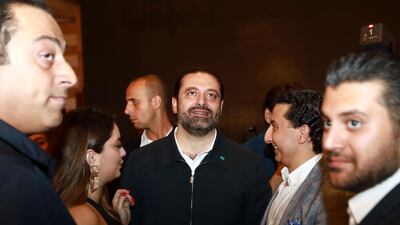Hezbollah emerged in Lebanon in the 1980s to resist Israeli occupation and grew in size, strength and political influence under Iranian patronage. The militia is accused of assassinating former Lebanese Prime Minister Rafik Hariri and has been labelled a terror group by the US and others in the international community. But following Lebanon's first election in nine years on Sunday, Hezbollah is now the strongest force in Lebanese politics, albeit through a patchwork of alliances, and with that status comes much sought-after veto power. Its attempts to use parliamentary success to legitimise a violent militia – one larger than the Lebanese army that has sent thousands of fighters into Syria – appear to be bearing fruit. Its political gains on Sunday are troubling for many in the region, both for internal Lebanese dynamics and for dealing with the aggression of Tehran, which will gain considerably from Hezbollah's gains.
Lebanon's power-sharing agreement – which elevates a Sunni prime minister, a Shia speaker and a Maronite Christian president – alongside a new electoral system kept turnout below 50 per cent. Prime Minister Saad Hariri, whose Future Movement party lost a third of its seats, is likely to continue to govern, albeit drastically weakened. Although Hezbollah gained a majority, fortuitously it failed to achieve the two-thirds of seats required to push through constitutional changes. Lebanon is bedevilled by heavy unemployment, ageing infrastructure, an ailing economy, high public debt and is struggling to integrate more than a million Syrian refugees. Hopes that a political overhaul would resolve these problems have been nullified.
Further afield, a bolstered Iranian regime is now likely to continue with its programme of regional destabilisation, while Israeli Education Minister Naftali Bennett tweeted that Israel will now not differentiate between the state of Lebanon and Hezbollah, potentially paving the way for a calamitous confrontation. Lebanon has for decades been used as a battleground for bubbling neighbouring disputes.
Hezbollah leader Hassan Nasrallah said the group’s gains represented a “great political and moral victory for the resistance option that protects the sovereignty of the country”. With overarching Iranian influence, a debilitated prime minister and a political system that is as stagnant as it is rigid, the claim to true sovereignty looks weak. Counterintuitively, the election result could create enormous challenges for Hezbollah, which is now charged with helping to govern, rather than hiding its inaction behind its minority status. It now has to be part of the solution to Lebanon’s myriad problems, a status it seems ill-disposed and unable to fulfil but will now be held to account by the electorate.
That said, it is clear that the militia's political wing now has the opportunity to exert real power in an extremely volatile region. Concerns that Sunday's elections would change nothing have unfortunately given way to genuine fears that they will, albeit outside Lebanon's domestic political arena.

